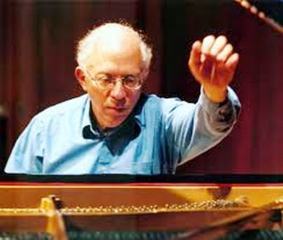|
Back
Adventures In Time And Space New York
Peter Jay Sharp Theater, Juilliard
01/27/2017 -
Focus! 2017: Our Southern Neighbors. The Music of Latin America:
Anabella Enrique: Cuando la luna descendía a la tierra (World premiere)
Andrés Nuno de Buen: Dúo
German Cáceres: Cartas Interdimensionales (World Premiere)
Francis Schwartz: Baudelaire’s Uncle
Tania León: Satiné
Rodolfo Acosta R.: En mis suenos aún existen mil futuros
Alejandro Cardona: Tlanéhuatl (“Raíz/Root”): Third Notebook
Ricardo Romaneiro: Partita (Remixed)
Collected Salsa Nueva
New Juilliard Ensemble: Joel Sachs (Director/Pianist), Tianyang Gao, Soo Choi (Amplified Violins), Grace Takeda (Amplified Viola), Andrée Werner (Amplified Cello), Jack McGuire (Amplified Bass), Joseph Lavarias (Bassoon), Jake Darnell (Percussion), Jacqueline Horner-Kwaitek (Mezzo-soprano), Daniel K. Kurland, Daniel Parker, Vatche Jambazian, Wei Lin Chang, Mackenzie Melemed, Anna Han, Derek Wang, Rolando Alejandro (Pianos), Antonio Guarino, Benjamin Cornavaca (Drums), Mariel Werner, Mariko Wyrick, Philip Sheegog (Cellos), Philip Solomon, Andrew O’Donnell (Clarinets), Jessica Fellows, K.J. McDonald (Violins), Joseph Bricker (Xylophone)

J. Sachs (© Nan Melville)
The unhappy thwarting of pleasures during New York’s January concert-going are essentially Sins of Omission. So much is happening at one time–enough for an entire year of music in other cities–that one is aware of neglecting wonderful things, simply because of their simultaneous performances.
Last night, reading the programs, and Joel Sachs’ splendid–and socially aware–introduction to the six-part series of contemporary Latin American composers at Juilliard last night, I realized that I have been missing some of the most fascinating new music in the city.
Added to the guilt is that attendance for virtually all of the Barenboim Bruckner-symphonies at Carnegie Hall was a preordained pleasure. Outside of trivial reservations, how bad could they be? Still, as a mere human, it wasn’t possible to dream about the Bruckner finales and crescendos without actually listening to them in that great hall. (Sigh)
Last night, though was an opportunity to read Mr. Sach’s very personal piece about Latin America and its new music.
My only visits, to Peru, Guatemala and Ecuador these past few years, have brought forth the same surprising feeling of warmth natural beauty, the discovery of grandiose architecture and paintings. For the music, though, I had to turn to this fifth concert, which offered four works that absolutely stuck in my cranium, which I would love to hear again.
Mind you, the others weren’t bad. Andrés Nuno de Buen gave a pointillistic Duo for bassoon and drums, clever and inventive. Equally interesting in sounds was Rodolfo Acosta R.’s In My Dreams, A Thousand Futures Still Exist, a work of music and philosophy, and a soundscape of brilliant playing by clarinet, cello and piano. I only wish I could have followed the structure as well as the sounds themselves.
And oh, the sounds and rhythms of Alejandro Cardona’s Tlanéhuatl (“Raíz/Root”) were fascinating. Each of the four movements gave a different picture. A woeful song of immigrants to Mexico City, a paean to Béla Bartók, a poetic feeling of dead leaves and finally a dance based on a motive from the 1856 one-man American invasion of Central America, against whom the composer’s great-grandfather had fought.
But four other works are in my mind still. Francis Schwartz’ Baudelaire’s Uncle (the title means nothing), was a surrealistic piano piece, with equal moments of piano pounding, chest-beating, mouth-sighing, eyes-tearing and arms-lifting, and performed by Mr. Sachs himself. Not with the simple bemusement of a serious musician. But all-out fun. The pianist had played this around the world, including the Mongolian desert. And I know that these people–who laugh and smile and delight in their very existence–would have roared approval. As we all did last night.

T. León (© Pix 11)
As for Tania León’s Satiné, this was a two-piano work which sung and resounded and was replete with never-ending invention. Ms. León is well-known both in dance and musical circles throughout New York, and for good reason. The work, named after a South American tree, had both energy and reticence. The duo-pianists Konstantin Valianatos and Alvin Zhu gave it pure joy. It could have been composed by Darius Milhaud, but Ms. León’s personality came out in each wonderful measure.
An equal vigor was in Ricardo Romaneiro’s Partita (Remixed), which, yes, had the same challenge as Villa-Lobos’ Bachianas Brasileiras. This was a one-movement Bach-inal with the Baroque harmonies and the Brazilian meters. And yes, this style had been done before, but not with such zest, such treble colors coming from xylophone, violin, cello and piano.
Confessedly, my favorite work was the opening When The Moon Dwelled on the Earth, by Argentinian composer Anabella Enrique. The violins, viola, cello and bass, were all amplified. Not only for the greater sound, but for the replication of the earliest pre-Columbian clay instruments of the early Guarani people.
Not only is Ms. Enrique an expert on this indigenous music, but as a descendant from the Guaranis, she has a special feeling for their Creation stories and music, both of which came out in this haunting music.
I said “special feeling” but it should have said “adoration.” For when listening to this quintet, one heard not only the alien sounds of the melodies, but–in Ms. Enrique’s words–”the windy and rough timbre of the traditional Guarani ravé, a rustic three-stringed violin that mystically mirrors the three mystical worlds.”
Not only did it pierce this listener’s unconscious mind, but it would given joy to Claude Lévi-Strauss. That philosopher/anthropologist was forever searching for our pasts in South America, but finally gave up. I think Ms. Enrique’s music might have vivified his challenge and given him promise that our universal past is always with us.
Harry Rolnick
|